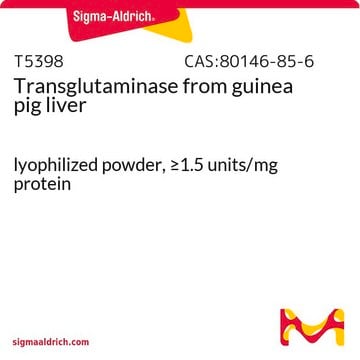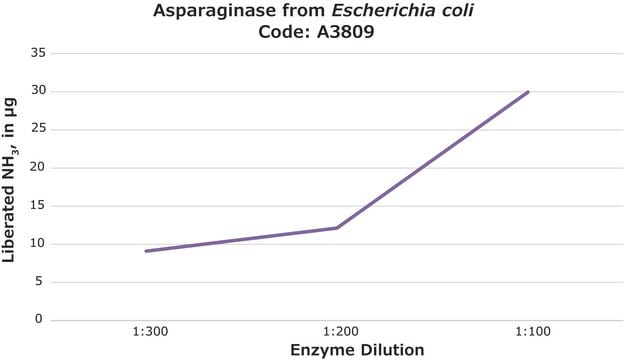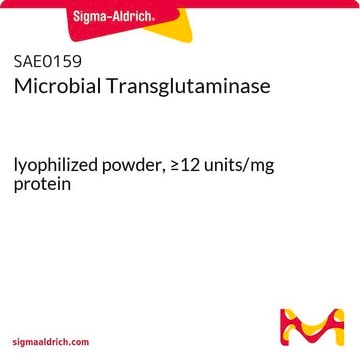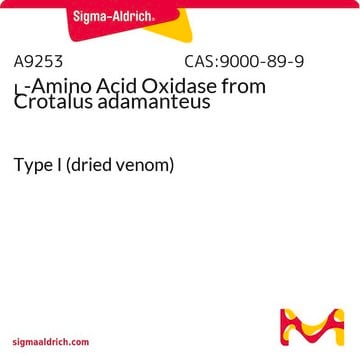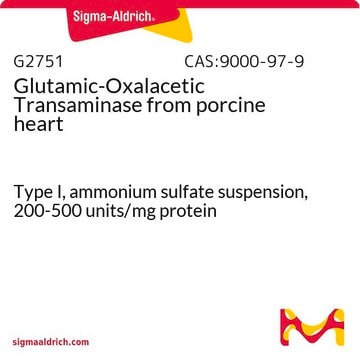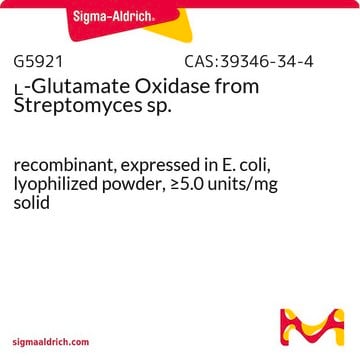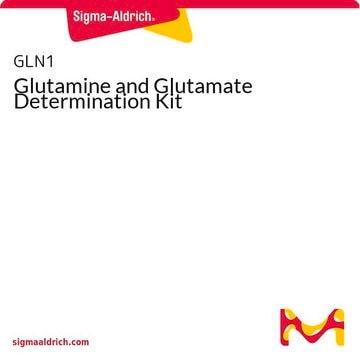G5894
Glutaminase from Escherichia coli
Grade VII, lyophilized powder, 500-1,500 units/mg protein
Synonym(s):
L-Glutamine amidohydrolase
Sign Into View Organizational & Contract Pricing
All Photos(1)
About This Item
CAS Number:
MDL number:
UNSPSC Code:
12352204
NACRES:
NA.54
Recommended Products
type
Grade VII
Quality Level
form
lyophilized powder
specific activity
500-1,500 units/mg protein
composition
Protein, ~10% Lowry
storage temp.
−20°C
Looking for similar products? Visit Product Comparison Guide
Biochem/physiol Actions
Glutaminase catalyzes the conversion of glutamine to glutamate.
Linkage
Chromatographically purified from Grade V
Unit Definition
One unit will deaminate 1.0 μmole of L-glutamine per min at pH 4.9 at 37 °C.
Physical form
Lyophilized powder containing stabilizer and potassium succinate
Storage Class Code
11 - Combustible Solids
WGK
WGK 1
Flash Point(F)
Not applicable
Flash Point(C)
Not applicable
Personal Protective Equipment
dust mask type N95 (US), Eyeshields, Gloves
Certificates of Analysis (COA)
Search for Certificates of Analysis (COA) by entering the products Lot/Batch Number. Lot and Batch Numbers can be found on a product’s label following the words ‘Lot’ or ‘Batch’.
Already Own This Product?
Find documentation for the products that you have recently purchased in the Document Library.
Natalie E Simpson et al.
Epigenetics, 7(12), 1413-1420 (2012-11-03)
The interplay of metabolism and epigenetic regulatory mechanisms has become a focal point for a better understanding of cancer development and progression. In this study, we have acquired data supporting previous observations that demonstrate glutamine metabolism affects histone modifications in
Krupa Shukla et al.
Journal of medicinal chemistry, 55(23), 10551-10563 (2012-11-16)
Bis-2-(5-phenylacetamido-1,2,4-thiadiazol-2-yl)ethyl sulfide (BPTES) is a potent and selective allosteric inhibitor of kidney-type glutaminase (GLS) that has served as a molecular probe to determine the therapeutic potential of GLS inhibition. In an attempt to identify more potent GLS inhibitors with improved
Katsutoshi Yuasa et al.
FEBS letters, 586(19), 3464-3470 (2012-09-18)
Chromatin loops formed between distant regulatory elements and promoters modulate gene expression. We identified a novel distant regulatory element located approximately 120kb downstream of the gls promoter, and examined its regulatory relevance to gls gene expression in C2C12 cells by
Felix List et al.
Chemistry & biology, 19(12), 1589-1599 (2012-12-25)
Nitrogen is incorporated into various metabolites by multifunctional glutamine amidotransferases via reactive ammonia generated by glutaminase hydrolysis of glutamine. Although this process is generally tightly regulated by subsequent synthase activity, little is known about how the glutaminase is inhibited in
Catherine Qiurong Pan et al.
FEBS letters, 586(17), 2674-2691 (2012-06-20)
The BNIP-2 and Cdc42GAP Homology (BCH) domains constitute a new and expanding family of highly conserved scaffold protein domains that regulate Rho, Ras and MAPK signaling, leading to cell growth, apoptosis, morphogenesis, migration and differentiation. Such versatility is achieved via
Our team of scientists has experience in all areas of research including Life Science, Material Science, Chemical Synthesis, Chromatography, Analytical and many others.
Contact Technical Service
